by Urban Faith Staff | Jul 4, 2023 | Black History, Headline News, Heritage |
In the nineteenth century, many American communities and cities celebrated Independence Day with a ceremonial reading of the Declaration of Independence, which was usually followed by an oral address or speech dedicated to the celebration of independence and the heritage of the American Revolution and the Founding Fathers. On July 5, 1852, the Ladies’ Anti-Slavery Society of Rochester, New York, invited the Black abolitionist and civil rights leader Frederick Douglass to be the keynote speaker for their Independence Day celebration. The Fourth of July Speech, scheduled for Rochester’s Corinthian Hall, attracted an audience of 600. The meeting opened with a prayer and was followed by a reading of the Declaration of Independence. When Douglass finally came to the platform to deliver his speech, the event took a jarring turn. Douglass told his audience, “This Fourth of July is yours, not mine. You may rejoice, I must mourn.” And he asked them, “Do you mean, citizens, to mock me, by asking me to speak today?”
Within Douglass’ now-legendary address is what historian Philip S. Foner has called “probably the most moving passage in all of Douglass’ speeches.”
What, to the American slave, is your 4th of July? I answer: a day that reveals to him, more than all other days in the year, the gross injustice and cruelty to which he is the constant victim. To him, your celebration is a sham; your boasted liberty, an unholy license; your national greatness, swelling vanity; your sounds of rejoicing are empty and heartless; your denunciations of tyrants, brass fronted impudence; your shouts of liberty and equality, hollow mockery; your prayers and hymns, your sermons and thanksgivings, with all your religious parade, and solemnity, are, to him, mere bombast, fraud, deception, impiety, and hypocrisy—a thin veil to cover up crimes which would disgrace a nation of savages. There is not a nation on the earth guilty of practices, more shocking and bloody, than are the people of these United States, at this very hour.
On this and every July 4th, Americans might do well to re-read and reflect on Douglass’ famous message. It challenges us to move beyond the biases and blind spots of our own cultural privileges and consider those around us for whom, as Langston Hughes said, “America has never been America.”
Read Douglass’ complete speech here, and watch actor Danny Glover recite an excerpt from the address below.
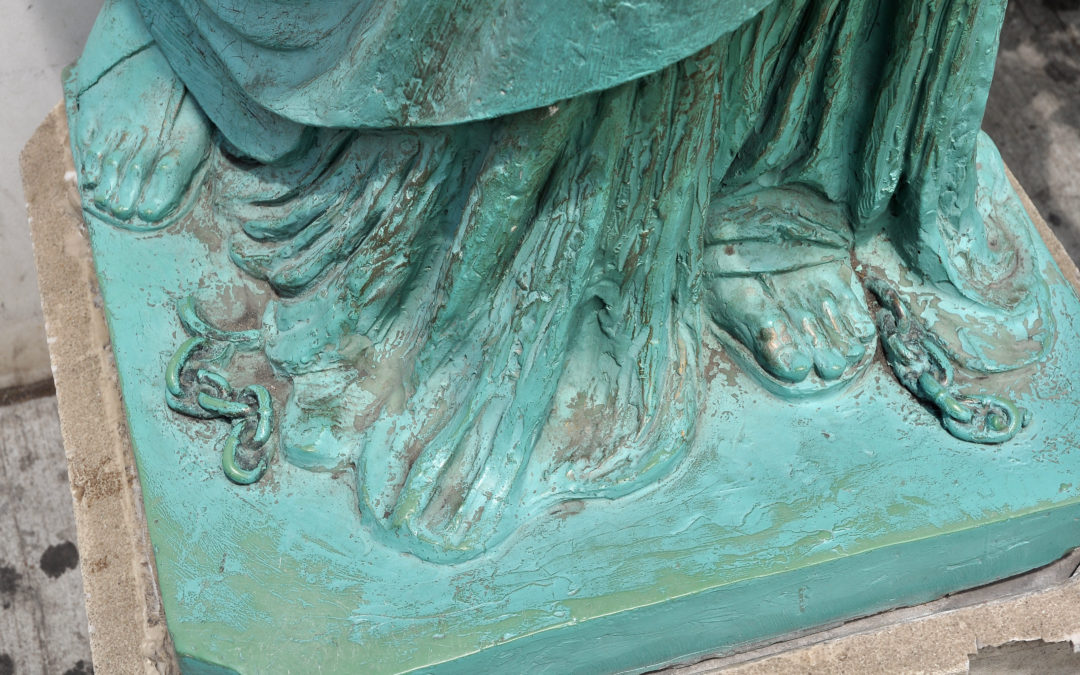
by Denise Anita Hill | Jun 27, 2023 | Black History, Commentary, Headline News |
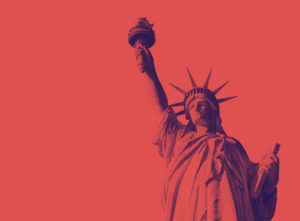
“Liminal” is defined as the space between. It is the no-longer before, and the not-yet other. It is the space where we find ourselves caught between the light of Juneteenth and the shadow of July 4th. We are caught in the space between. No longer enslaved on plantations, but not yet with a freedom fully realized. It’s an imaginative space; an emergent space; and a space for reflection.
It is in this space that I am reminded of the Statue of Liberty, and the broken chains at her feet. I first learned about the chains in 2017, at a training in Chicago led by Dr. Joy DeGruy. She told the story of how the chains were part of the original vision of the statue, how American financiers insisted that the chains be removed, and how the sculptor still managed to sneak the chains in under Lady Liberty’s garments, lying broken at her feet. She told the story how the National Park Services didn’t talk about the chains unless someone happened to ask. The chains were not part of the Park Services’ narrative about the Statue. In the Statue’s 135-year history, information about the chains have only officially been included in the park service’s literature and website for about the past six years.
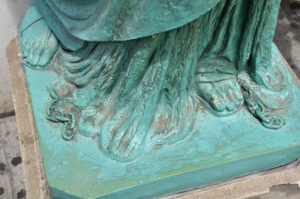
Yasmin Sabina Khan goes even deeper in her work, “Enlightening the World: The Creation of the Statue of Liberty.” Conceived in 1865 by Édouard de Laboulaye, sculpted by Frédéric-Auguste Bartholdi over the course of approximately 20 years, the Statue of Liberty was unveiled at New York’s Ellis Island as “Liberty Enlightening the World” in October of 1886. At the base of the Statue, out of view from anyone looking from ground level, lie the broken chains of slavery. Visible only from helicopter or drone, the chains weren’t spoken of. Laboulaye was an ardent abolitionist. With the end of the US Civil War in 1865, Laboulaye imagined a gift that would embody the significance of the liberation of those who were enslaved. Bartholdi’s original model placed the torch of liberty in one hand, and broken chains in the other. The Statue of Liberty’s entire visual and artistic vocabulary was meant to both celebrate and honor the freedom of those enslaved in America. But financiers balked at the idea of chains placed anywhere on the Statue, and after profuse opposition by Bartholdi, the chains were removed, replaced by a tablet emblazoned with the Roman numerals for July 4, 1776. Since they aren’t easily visible, and since there was no concerted public effort to connect the statue with the narrative of the abolition of chattel slavery, the memory of it’s connections faded. And for the past 135 years, barely anyone remembered the chains.
For Black people within this liminal march of history, the Statue has long sat as a symbol of hypocrisy—celebrating a freedom that became connected to a honoring of ideals that have yet to be realized. There’s much to unpack about our historical reactions to the unveiling of the Statue, but there’s also much to be said about the loss of memory. The obscuring and loss of communal memory around the presence, history, and meaning of the chains at the feet of the Statue of Liberty is important because it reminds us that memory is important. And not only is memory important, memory is crucial in this liminal space between freedom and freedom. Memory is what helps us imagine. Memory is what helps us create. It’s something we can use to construct and define a new world, a new freedom, a new way of being. We must tap into it.
In his book, “Something Torn and New: An African Renaissance” Ngugi wa Thiong’o writes, “creative imagination is one of the greatest of re-membering practices…” and that “memory is the link between the past and the present, between space and time, and it is the base of our dreams.” Harnessing memory is our work. These broken chains at our feet, the light of Juneteenth, the long shadow of July 4th—this liminal space—all of it is here to remind us that we have worlds to build. We have a freedom to define—to make clear and meaningful. It is within this creative tension where we have the possibility to gain a clear-eyed view of what a full realization of freedom could look like, both collectively as a community and a country, and particularly in the living out of our individual lives and individual situations. But understand, there can be no clear expression of freedom without integrating communal memory into the foundation of work.
If memory is the base of our dreams, what are our dreams of freedom? What if we could transform freedom in the same ways that we’ve always transformed culture? In this liminal space of history, we’ve seen Black creativity, Black genius, Black art, and Black joy shift and drive culture (and economies) around the world. Have we fired that same ingenuity in our definitions of freedom? What would the world look like, if we defined and constructed freedom based on our criteria, our imaginations, our memory? It might look something like a society built on the idea of thriving rather than destruction. It might look something like a society built around dignity—of humans, animals, and the earth. It might look something like systems built to nourish and sustain life rather than profit. Freedom could look like so many different visions of more and better. The dreaming is up to us.
We have work to do. We have worlds to build. We have a freedom to create. And as we go about protesting and advocating for our lives, here in this liminal space between freedom that was and freedom that might yet be, may we remember that the work we have to do, the worlds we are building, and the freedom we are creating, cannot reach their fullest expression without our communal memory.
Let us remember the chains broken at our feet, so that we may creatively continue in our generation’s leg of the journey toward the light of freedom fully realized.
by Clarence Shuler | Jun 16, 2022 | Black History, Commentary, Headline News, Social Justice |

Imagine being a slave, and on this particular day, Union Army Major General Gordon Granger forced your master to set you free immediately! You and your master may have heard about the Emancipation Proclamation two years earlier, but it didn’t free you.
Gaining physical freedom is one thing. But how did formerly enslaved people gain emotional freedom while avoiding the heavy chains of emotional slavery due to the incredible injustice of their past and present reality? What possible relationship could or would they have with their former master?
What about you? As many are focused on celebrating Juneteenth and freedom, are you still in emotional chains due to injustice? How do you go on functioning while injustice continues? Black people are still being shot. Churches and schools are targets for mass murders.
Maybe you’re not in physical chains, but are you emotionally enslaved?
Want your freedom? When thinking of slavery, Grandma Shuler, my dad’s mom, always comes to mind. She was born in 1879 in South Carolina where an unofficial slavery still existed! This eighty-five-year-old’s smile and lack of bitterness profoundly impacted me when I was ten years old.
I considered becoming a Black Panther because the Ku Klux Klan ran from them. It was difficult for Blacks to be anything other than sharecroppers (a new kind of slavery) immediately after slavery was abolished. Grandma and Grandpa and their adult children lived on the same land where their parents had been enslaved. Their house’s foundation was a slave shack with an outhouse. This was 1964!
My dad has some of Grandma’s genes. He and many Black men like him had a quiet dignity no matter how badly they were treated in the ’50s, ’60s, and ’70s. They didn’t fight back or curse at their oppressors. Injustice couldn’t break their spirits.
But how do you reconcile Ahmaud Arbery, Breonna Taylor, George Floyd, and the recent shootings at the school in Uvalde, TX, and the grocery store in Buffalo, NY?
Initially, I felt that part of me died when I heard about the struggle and murders of Ahmaud Arbery and George Floyd. Certainly, I wasn’t free emotionally. Ironically, God spoke to me through a radio interview with two White humbled co-hosts who had done their homework. They got me talking about these murders. Surprisingly, it was therapeutic. I didn’t realize I needed to talk about it instead of keeping it inside. Many Black men don’t process it externally, which is slowly killing them.
How should we handle injustice when peaceful efforts require more discipline than giving in to our emotions? History shows us there is power in “radical love and forgiveness.” When Dylann Roof murdered nine members of Emmanuel African Methodist Episcopal Church in Charleston, S.C., during a prayer meeting in June 2015, many surviving friends and family shocked the nation when they chose to forgive. Emmanuel AME is one of the oldest Black congregations in the South and has a long history of anti-slavery activism, civil rights protests, and ongoing political engagement. Even the late pastor Clementa Pinckney, one of the victims shot that day, was a state senator who pushed for police to wear body cameras. So why forgive? Chris Singleton, who lost his mother in the attack, told USA Today, “After seeing what happened and the reason why it happened, and after seeing how people could forgive, I truly hope that people will see that it wasn’t just us saying words,” Singleton says. “I know, for a fact, that it was something greater than us, using us to bring our city together.”
When we don’t forgive, we put ourselves in emotional slavery. Our unforgiveness subconsciously permeates every relationship – and I’ve found that relationships are the key to healing racial divides. A freedom that can never be stolen is not about how people treat me. It’s all about how I choose to respond to it. In my latest book, Life-Changing, Cross-Cultural Friendships, which I co-wrote with Gary Chapman, author The 5 Love Languages, we talk in depth about our journey of an authentic friendship through some of the most racially divisive times in history and provide a roadmap for others to do the same.
Dr. Martin Luther King, Jr. once said, “We must develop and maintain the capacity to
forgive. He who is devoid of the power to forgive is devoid of the power to love. There is
some good in the worst of us and some evil in the best of us. When we discover this,
we are less prone to hate our enemies.”
My grandma couldn’t force White people or anyone else to give her justice, equality, or simply human courtesy, yet she continued to smile. Grandma was not weak. When she spoke, people moved. This barely five-foot-tall woman lived with her six-foot two-inch husband, raised seven children, and could still shoot her rifle with accuracy well into her eighties. She couldn’t go to the hospital to give birth. She and Grandpa lived off the land to survive and fed their children without a formal education. Imagine all that she saw, being born in 1879 and living until 1971. Her freedom was not dependent on White people giving her their version of justice. She treated all people with respect. She said, “As I’m treating others with respect, even some mean White people, I’m loving God and respecting myself.”
And, of course, Grandma smiled.
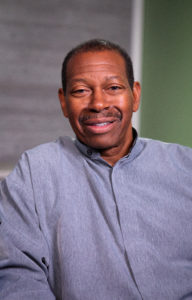
About the. Author
Clarence Shuler is the President/CEO of BLR: Building Lasting Relationships. He’s authored ten books. He and Dr. Gary Chapman speak together at The 5 Love Languages, Date Night, and Life-Changing Cross-Cultural Friendship events. For more information, visit www.clarenceshuler.com.
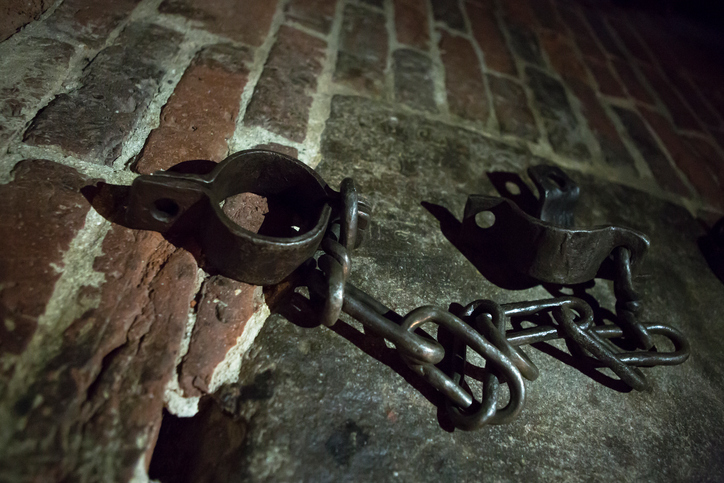
by Mwikali Munyao | Apr 24, 2022 | Headline News, Prayers & Devotionals |
John 8:31-38 NLT
31 Jesus said to the people who believed in him, “You are truly my disciples if you remain faithful to my teachings. 32 And you will know the truth, and the truth will set you free.”
33 “But we are descendants of Abraham,” they said. “We have never been slaves to anyone. What do you mean, ‘You will be set free’?”
34 Jesus replied, “I tell you the truth, everyone who sins is a slave of sin. 35 A slave is not a permanent member of the family, but a son is part of the family forever. 36 So if the Son sets you free, you are truly free. 37 Yes, I realize that you are descendants of Abraham. And yet some of you are trying to kill me because there’s no room in your hearts for my message. 38 I am telling you what I saw when I was with my Father. But you are following the advice of your father.”
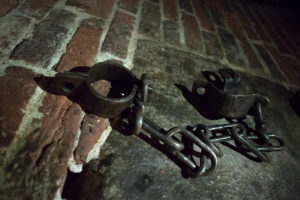
Slavery is a terminology that creates discomfort in conversations because it represents one of the worst atrocities a human life can undergo. It is easier to deny or be hush about it. Openly acknowledging that the human mind is capable of manufacturing an ideology to oppress and detain, mistreat and dehumanize another human being can be difficult for the mind to wrap around. Yet Jesus was not afraid to address slavery head on.
Jesus reveals the type of mentality we should have towards sin which is detest, avoid and conquer it. Sin is a master that loves slaves. There is nothing good that comes out of it. It will seduce, manipulate, use, and deplete you. And just when you think you are done, it will create a small sense of relief to trick you into thinking you are okay, only for you to succumb to another cycle that keeps going on and on.
It is easy to look at slavery from the perspective of what you know from history. However, there is a yoke of slavery that lurks every day in your life and that yoke is sin. Jesus desires for you to be free and live with no fear.
Have you been battling something that keeps making you sin over and over again? Are you accustomed to it to the point of not desiring to seek freedom? You have to win in the mind and believe that you can be free and stay free. It is not by your might, but through Jesus Christ.
You deserve to see what a life of freedom looks and feels like. There is no human you will ever meet who loves and prays for slavery. So why should you accept sin as your master when you have the option of freedom? Jesus is able free you and shares tools through His Word on how to stay free. Release yourself from the yoke of sin, and step into the freedom that God desires for you.

by Caroline Sumlin, Urban Faith Contributing Writer | Mar 8, 2022 | Commentary, Headline News |
 You’re going to rebel once you get to college,” they said to me.
You’re going to rebel once you get to college,” they said to me.
“They” were my high school friends. I was always the Goody Two-Shoes of the group and they always let me know just how weird I was and just how much they hoped I would change my ways. My friends believed that I was a Goody Two-Shoes because my mom was strict. She had very specific guidelines about with whom and where I could socialize when I was in high school. While I thought some of the rules were a little extreme, as all teenagers do, I mostly understood and always respected them.
However, it wasn’t the rules that kept me disciplined. It was me.
Well, it was actually the Holy Spirit. I just didn’t know it back then.
While I’m grateful for my mother’s rules, and even plan to repeat many of them with my own children to ensure their safety, I wasn’t interested in being a rebellious child in the first place. I had zero interest in parties. I never desired to take a drink. Sneaking out of the house was not on my radar. I loved to study. I was completely obsessed with being in the band and on the speech team. My idea of a good time was diving into a good book and grabbing a white chocolate mocha from the local Caribou Coffee. To put it frankly, I was genuinely uninterested in what a lot of other teens were into. I never understood why kids my age were interested in certain activities and substances that would jeopardize their health and safety for a few fleeting moments of fun. It just wasn’t worth it to me.
Fast forward to college.
To be honest, I was so nervous about college for this very reason. I knew that the college atmosphere was about drinking, partying, and being as irresponsible as possible with your newfound freedom. I figured I’d struggle making friends due to my “Goody Two-Shoes” nature. Who wants to hang out with the girl who would rather read a book than go to a party?
I was right.
When many of my college peers found out that I wasn’t into going to the club on Friday night, they showed no interest in pursuing a friendship. Others befriended me, but they also tried to make it their mission to get me to engage in certain activities that I was not comfortable with. They were convinced that I was too uptight and “just needed to loosen up a bit.” Eventually, I was the one walking away from those friendships.
 Thankfully, I found some friends who accepted me for who I was, but I couldn’t help but wonder what was it about me that wasn’t interested in what everyone else my age was interested in?
Thankfully, I found some friends who accepted me for who I was, but I couldn’t help but wonder what was it about me that wasn’t interested in what everyone else my age was interested in?
Let’s be real here. Your college years and your twenties are known for happy hours, going to the club, random hookups, and the like. Yet, not only was I uninterested in the typical idea of fun, it actually made me feel rather uncomfortable and I avoided it at all costs. The big question I couldn’t answer at the time was, “why?”
When I was 16, I began slowly pursuing a relationship with Christ. I started to learn even more about Jesus as I matriculated through college. During my senior year, I completely surrendered my life to Christ. My heart was all-in and I never looked back.
The stronger my faith grew, the more disciplined I became in my thinking and my actions. However, I didn’t make the connection at the time between my faith and my personality. I thought my personality was just one that didn’t identify with the same thought patterns and behaviors as many other people I knew.
“Therefore we were buried with him by baptism into death, in order that, just as Christ was raised from the dead by the glory of the Father, so we too may walk in newness of life. For if we have been united with him in the likeness of his death, we will certainly also be in the likeness of his resurrection. For we know that our old self was crucified with him so that the body ruled by sin might be rendered powerless so that we may no longer be enslaved to sin, since a person who has died is freed from sin” (Romans 6:4–7, BSB).
The beauty of a relationship with Christ is that we get to walk in freedom. I think sometimes this freedom gets taken for granted. It doesn’t always feel like a super spiritual feeling that we may have imagined it to be. We may not feel like we are floating on air, dancing in the fields with butterflies, and smiling from ear to ear on a daily basis. In fact, many of our days will be challenging, stressful, and mundane. That does not negate the fact that we are still walking in freedom. Freedom from sin, freedom from the Law, freedom for our future, and freedom to walk in the fruit of the Spirit.
Walking in this freedom may look like a loss of interest in certain activities as the Holy Spirit reveals to you their sinful nature. Walking in freedom might also look like a newfound discipline in the habits you set for yourself and the goals you desire to accomplish. Perhaps this freedom looks like a care for your future that you didn’t have before. Prior to Jesus, you were living day by day, taking life as it came, without much of a plan for tomorrow. Now, you look forward to the future and align your daily actions with that hope.
I was baptized when I was 16. I accepted Jesus as my Lord and Savior, but my 16-year-old brain didn’t understand the vastness of the freedom that I was walking in. All I knew was that my thought process and desires were much different than those of my peers. I couldn’t explain why, but I was confident in my choices. While others described my discipline to be restrictive, I found my discipline to be the most freeing thing ever, and I still do. The choices I made 10 years ago have resulted in abundant fruit as I enter middle adulthood. By following Christ, I am not a slave to the consequences of poor choices I could have made when I was younger. Seeing the fruits of my labor motivates me to continue with a more disciplined lifestyle now because I know that I will continue to bear fruit as I get older.
I’m now a 30-something year-old married mama of two little girls and the need for discipline is even more prevalent today than it was 10 years ago, but for different reasons. It’s easy to feel like children, discipline, routines, structure, etc., take away the freedom from your life. Adulthood reminds you that the ways of your younger years just don’t cut it anymore. The donuts you ate for breakfast show consequences around your midsection and at your next doctor’s visit. The late nights you once tolerated in your twenties result in poor job performance the next day when you’re in your thirties. As a parent, your life now revolves around the needs of your children. You lay down your selfish desires to serve your family. You wish you could have more time to yourself, but your children need to eat lunch. All of these realities can, understandably, make you long for those younger years that “felt freer” than the ones you are living in.
Much like submission to Christ results in freedom from sin, submission to the discipline that is required of adulthood results in freedom from the long-term consequences that lack of discipline will result in.
Discipline is freeing.
The Christian life is freeing.
But we must value the result of freedom more than the short-term pleasures of sin.
The fruit you will bear as a result will always be worth it.










 Thankfully, I found some friends who accepted me for who I was, but I couldn’t help but wonder what was it about me that wasn’t interested in what everyone else my age was interested in?
Thankfully, I found some friends who accepted me for who I was, but I couldn’t help but wonder what was it about me that wasn’t interested in what everyone else my age was interested in?